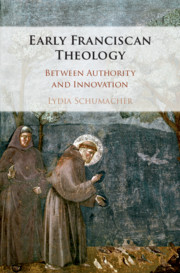Book contents
- Early Franciscan Theology
- Early Franciscan Theology
- Copyright page
- Dedication
- Contents
- Acknowledgements
- Abbreviations
- Chapter 1 Early Franciscan Theology: An Introduction
- Chapter 2 The Franciscan Context
- Chapter 3 The Philosophical Context
- Chapter 4 Theological Vision
- Chapter 5 Theistic Proof
- Chapter 6 The Divine Nature
- Chapter 7 The Trinity: Context
- Chapter 8 The Trinity: Doctrine
- Chapter 9 Christology
- Chapter 10 Incarnation
- Chapter 11 Moral Theology
- Chapter 12 Conclusion: The Promise of Early Franciscan Theology
- Bibliography
- Index
Chapter 11 - Moral Theology
Published online by Cambridge University Press: 14 June 2019
- Early Franciscan Theology
- Early Franciscan Theology
- Copyright page
- Dedication
- Contents
- Acknowledgements
- Abbreviations
- Chapter 1 Early Franciscan Theology: An Introduction
- Chapter 2 The Franciscan Context
- Chapter 3 The Philosophical Context
- Chapter 4 Theological Vision
- Chapter 5 Theistic Proof
- Chapter 6 The Divine Nature
- Chapter 7 The Trinity: Context
- Chapter 8 The Trinity: Doctrine
- Chapter 9 Christology
- Chapter 10 Incarnation
- Chapter 11 Moral Theology
- Chapter 12 Conclusion: The Promise of Early Franciscan Theology
- Bibliography
- Index
Summary
The late medieval Franciscan thinker William of Ockham is often heralded as the first to formulate a full-blown moral theory that turns on obedience to divine commands.1 Well before his time, however, the Halensian Summists had offered the first Franciscan statement of this theory, in what represented a significant departure at the time from the more common focus on moral virtues and vices, such as can be found in earlier contemporaries like Peter of Poitiers, Praepositinus, Philip the Chancellor, William of Auxerre, and Roland of Cremona.2 According to recent critics, the divine command theories that eventually usurped such virtue theories exhibit a decided tendency to undermine personal moral autonomy and thus responsibility. After all, they render morality a matter of merely following arbitrary regulations, which must be accepted unquestioningly from an authoritative source.
- Type
- Chapter
- Information
- Early Franciscan TheologyBetween Authority and Innovation, pp. 242 - 258Publisher: Cambridge University PressPrint publication year: 2019



